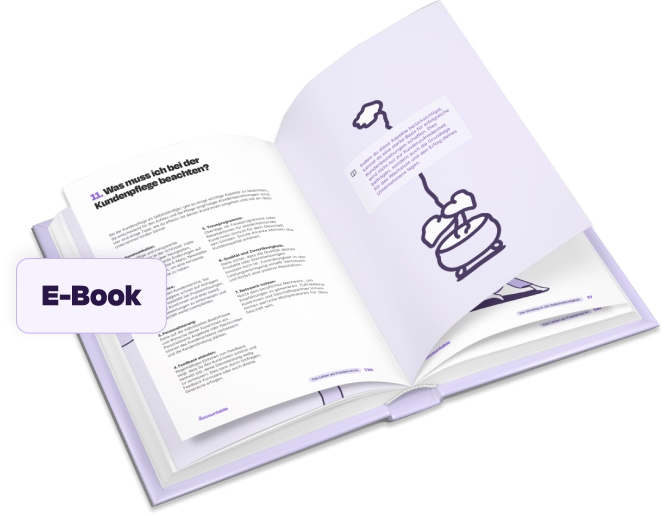Whether freelancers, self-employed professionals or KMUs and large companies - e-invoices are becoming increasingly important in day-to-day business. While e-invoices have long been mandatory for public contracts, electronic invoices will soon also become standard in the B2B sector. This makes it all the more important to familiarise yourself with the most important information now.
Our overview of the most frequently asked questions about e-invoices will prepare you for the creation, processing and archiving of e-invoices!
Legally compliant e-invoices are based on EU Directive 2014/55/EU and the resulting EU standard EN 16931. They must use a structured format for electronic, machine-readable invoices in which invoice-relevant documents can be embedded. The electronic invoice format is used for the creation, transmission, receipt and further processing of all invoice information. The structured metadata can be automatically extracted and processed for greater efficiency in accounting.
💡Create and receive e-invoices for free with Accountable. Test it now!
Legally compliant invoices must fulfil all the requirements of EN 16931, the E-Invoicing Ordinance and the planned Growth Opportunities Act of the Federal Ministry of Finance. Structured XML formats or the more complex EDI formats are generally used for this purpose. In public invoicing, XML formats such as XRechnungen serve as an established, officially recognised standard. Hybrid PDF and XML formats such as ZUGFeRD are also accepted.
Visual formats such as PDF invoices do not enable machine-readable processing and do not fulfil the legal requirements. Other electronic invoice formats without structured data records in accordance with the legal requirements are also not accepted. They therefore fall under the category of ‘other invoices’. In the B2B sector, ‘other invoices’ are still possible with the consent of the invoice recipient. Since 2020, only electronic invoices may be issued and received in the public sector.
As long as they fulfil the legal requirements, various standards or formats can be used for e-invoices. The two most common forms of e-invoices as defined by the e-invoicing regulation, EN 16931 and the Growth Opportunities Act include:
Other possible variants for e-invoices are EDI invoices. This is also an electronic invoice format that enables automatic, electronic processing. Compared to XInvoices and ZUGFeRD, however, EDI requires more effort. The reason for this is that the format requires individually agreed exchange agreements and technical expertise during implementation. XRechnung and ZUGFeRD, on the other hand, offer only minor hurdles for implementation.
Recognised electronic invoice formats simplify accounting through automated workflows, transparent invoice creation and processing as well as standardised business processes. From invoice creation to invoice verification and archiving, they save time and costs, as recording, indexing and classification are highly automated. In addition, compliance with legal frameworks, space-saving, secure archiving and a high level of data protection are ensured.
In order to create legally compliant invoices, it is advisable to use reliable accounting or invoicing software such as Accountable. This also applies to recognised e-invoice formats. Digital solutions for document management or ERP systems such as SAP also generally offer the option of creating official e-invoices.
Although it is theoretically possible to create e-invoices manually, it is advisable to use suitable tools for e-invoices to ensure correctness. In addition, federal internet platforms such as the ‘Zentrale Rechnungseingangplattform’ (ZRE) and ‘Onlinezugangsgesetz-konforme Rechnungseingangsplattform’ (OZG-RE) can be used to exchange invoices with public authorities. Both enable suppliers and service providers to send official e-invoices to public clients.
Software solutions with an integrated e-invoice validator are used to check e-invoices in a similar way to how they are created. Here, the automatic extraction and validation of e-invoices is rule-based. During automatic validation, the syntax schema and XML tags of the data record are checked. If the content and structures are correct, the invoice is automatically forwarded to the accounting department or archive or, in the event of errors, is placed on resubmission, for example.
All public authorities and invoice issuers on behalf of public authorities must use recognised formats for e-invoices. The B2B sector is not yet required to use e-invoices.
This will change with the Federal Ministry of Finance's planned Growth Opportunities Act. E-invoicing will become mandatory for invoice exchange in the B2B sector from 1 January 2025 in staggered stages until January 2028 at the latest. From January 2025, companies must be prepared in principle to process official e-invoices, as their use does not require the consent of the invoice recipient.
The most important legal, technical and formal requirements for e-invoices include:
The most important legal regulations for e-invoices are the EU invoicing standard EN16931, the German Value Added Tax Act (Umsatzsteuergesetz), the Abgabenordnung, the GoBD and the so-called Wachstumschancengesetz.
Just as with traditional invoices, there are mandatory details that are part of every e-invoice. There is also additional information, such as the Leitweg-ID (routing ID) for public clients, which you need specifically for e-invoices. The most important contents include:
💡Tip from Accountable: Do you want to ensure that all mandatory information is included when creating invoices? Accountable is the tax software for the self-employed and offers you the opportunity to create legally compliant, professional e-invoices for free. Try it now!
E-invoices are legally equivalent to paper invoices and are subject to a ten-year retention obligation in accordance with the German Value Added Tax Act, the German Commercial Code and the German Fiscal Code. They must be archived in the original electronic format, readable at any time, analysable by machine and audit-proof.
20 Kapitel knallhart recherchiert und vom Steuerprofi geprüft
Kostenlos herunterladen

Author - Andreas Reichert
Andreas Reichert is a highly experienced tax advisor and partner of Accountable.
Who is Andreas ?Thank you for your feedback!
Useful
How much income tax is deducted from your income is largely determined by your tax class. There are ...
Read moreWorking as a self-employed professional has many advantages: You are your own boss and you can choos...
Read moreWorking with international clients can be tricky, depending on where exactly they’re located, whet...
Read moreWas Accountable für mich so besonders macht, ist der überragende Kundenservice. Ich habe bereits mit einigen Mitarbeitern zu tun gehabt und war jedes Mal aufs Neue sehr glücklich mit der Freundlichkeit und Professionalität, mit der ich begleitet wurde. Ich fühle mich verstanden und wertgeschätzt, das ist etwas besonderes in unserer heutigen Welt. Ein großes Dankeschön 🌟
Thomas Kaiser
Accountable ist ein intuitives Tool, mit dem Buchhaltung und Steuererklärung unproblematisch erstellt werden können-
Anonym
Freundlicher Kontakt mit Wissensvermittlung und verständliche Mitteilung. Top!
Anonym
Ich mache gerade eine tolle Erfahrung mit euch.Danke für eure Unterstützung
Sandro Antonio Sansiveri
Danke ich für meinen Teil bin noch am Anfang
Anonym
Very professional, responsive, and always available to clarify my questions. The guidance was clear and practical.
Jobe Michael
Für mich als Kleinunternehmer ist der Preis ein bisschen hoch, aber für alles, was ich bekomme: alle Übersichten von Einnahmen und Ausgaben, die Funktionen rund um das Auto... ist es einfach top. Und das letzte Update zu den wiederkehrenden Ausgaben war hervorragend! Dankeschön.
Ardalan Zamanimehr
Die App ist super! Intuitiv und perfekt für Selbstständige. Leider ist meine Position noch zu exotisch für Accountable um genau diese Leichtigkeit auch in Anspruch zu nehmen. Es gibt noch keine einfache Lösung für Selbstständige mit zwei Steuernummern da zwei Berufe. Sollte sich das mal ändern, Wechsel ich von meinem Steuerberater wieder zu Accountable!
Viktor Rosin
Sehr freundlich und gezielte , verständliche Angaben und Erklärungen
Pascal Koopmann
Auf meine Anfrage habe ich sehr schnell eine sehr nette und kompetente Antwort bekommen. Die Mitarbeiterin hat mein als Verbesserungsvorschlag weitergegeben - und schon nach kurzer Zeit kam die Antwort, dass das entsprechende Feature eingearbeitet wurde. Tolle Arbeit!
Dr. Annika Krummacher